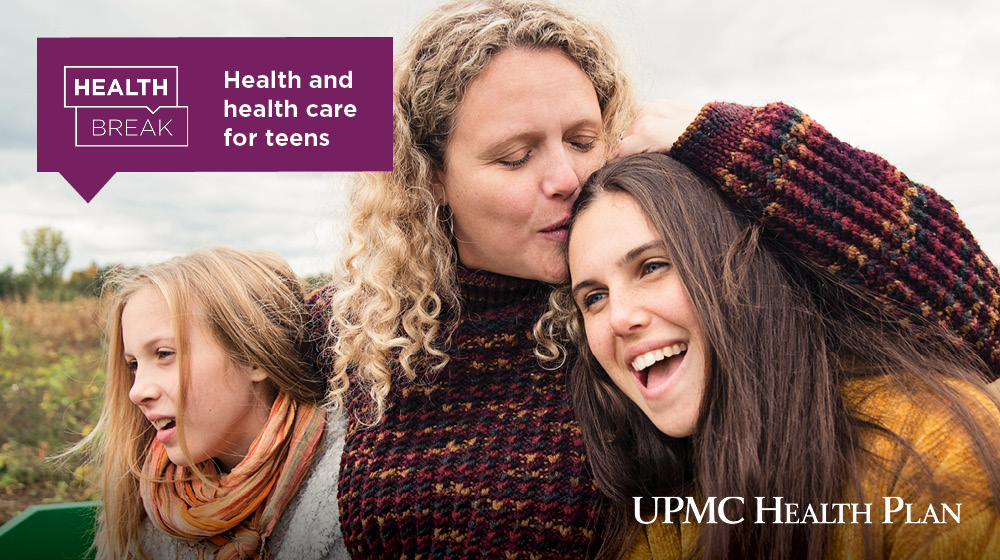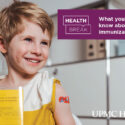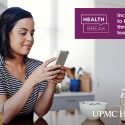Health Break: Health and health care for teens

A podcast for UPMC Health Plan members, Health Break is your quick guide to caring for your mental and physical health, prioritizing wellness, and making the most of your health insurance plan.
Episode 26: Take a Health Break with Dr. Sonika Bhatnagar
Dr. Bhatnagar takes a Health Break to talk about health and health care for teens.
Episode transcript:
Camille: Welcome to Health Break by UPMC Health Plan, your quick guide to health, wellness, and how to make the most of your health insurance plan. I’m your host, Dr. Camille Clarke-Smith. I help to oversee the quality of the plans and programs we offer at UPMC Health Plan.
Angelo: And I’m your co-host, Angelo Bartic. I’m a health coach who works with our members on making healthy lifestyle habits and setting goals. This is your…Health Break.
Camille: Hey everyone. Today we have with us Dr. Sonika Bhatnagar. Today we’ll be talking about health and health care for teens. Thank you, Dr. Sonika, for being here with us today.
Dr. Bhatnagar: Thanks so much, Camille, for having me.
Camille: Why are annual well-visits so important for healthy teens? And if a teen is up to date on their shots, do they need to do these visits?
Dr. Bhatnagar: So, Camille, that’s a great question and a lot of parents ask that—you know, if my child isn’t due for shots, do I need to come in? And while shots are important and help prevent illnesses, cancer, well-child visits are so much more. It gives us an opportunity to address a child’s physical health in terms of tracking their growth and development, their behavioral health in terms of screening for anxiety and depression. It gives us an opportunity to promote a healthy lifestyle and promote safety through means of using a seatbelt always, talking about safe teen driving, an opportunity to discuss any concerns that either the parent has or the adolescent has, and it really provides an opportunity for a team approach to overall health. These regular visits create a strong, trustworthy relationship between the caregiver, the provider, and the adolescent.
Camille: You mentioned behavioral health. How can parents and caregivers help teens when it comes to behavioral health and what resources are out there?
Dr. Bhatnagar: Thanks for the question, Camille. It’s so important that we normalize the stress that adolescents are currently experiencing and that we destigmatize seeking help for behavioral health. Depression and anxiety are two of the most common behavioral health concerns in youth. And the adolescent and young adult years are [a] formative and critical time. The human brain is still in the midst of developing, and adolescents are working to find their own identity and role, but yet they don’t have that life experience in terms of how to handle these challenging times. So we need to recognize that behavioral health is an essential part of overall health. We need to empower youth and their families to recognize, manage, and learn from different emotions.
There’s a resource called RxWell. RxWell is a mobile app that was developed by the UPMC Health Plan to help members learn coping techniques in real time. So skills and techniques such as relaxation, meditation, and how to tolerate stress. There’s also an option to speak with a behavioral health coach. It’s available for free to UPMC Health Plan members and available to adolescents 16 and over. It’s a great resource that adolescents can access on their phone anywhere they are via an app, anytime. And of course, in the event of a behavioral health emergency, there are a number of crisis resources available such as 988.
Camille: So you’ve mentioned self-identity and empowerment, and we have some parents and caregivers who may be listening to the session right now. So how can we help teens feel more empowered in their health and health care?
Dr. Bhatnagar: We can do that by really helping kids start to get involved in their own medical care. And part of that is encouraging the adolescent to have an open conversation with their provider, including your child may attend all or part of the visit privately one-on-one with a provider to ask those more sensitive questions. So it’s really an opportunity for that confidential discussion to happen, and it’s important to know that we are here to partner with adolescents and their families to help ensure their best health.
Camille: Thank you so much for taking a Health Break with us.
Dr Bhatnagar: Thanks so much, Camille.
Camille: Call your child’s health care provider to talk about any physical or behavior health concerns or to find out if your child is due for immunizations. Remember, it’s important to have an annual well-visit, even if your teen is not due for additional shots. Be aware of your local behavioral health resources, resources from UPMC Health Plan like the RxWell app, and crisis hotlines.
Find show notes and more information at upmchealthplan.com/podcast. Join us as we continue exploring health, wellness, and how to make the most of your health insurance plan in the next episode of Health Break.
This podcast is for informational and educational purposes. It is not medical care or advice. Individuals in need of medical care should consult their personal care provider. Views and opinions expressed by the hosts and guests are solely their own and do not necessarily reflect those of UPMC Health Plan and its employees.
Related to this episode:
- View pediatric health services.
- Access our provider directory.
- Get connected to tools and programs to support your mental health based on your coverage type.
- Download RxWell.*
*RxWell is available to UPMC Health Plan members who are 14 years old or older.



